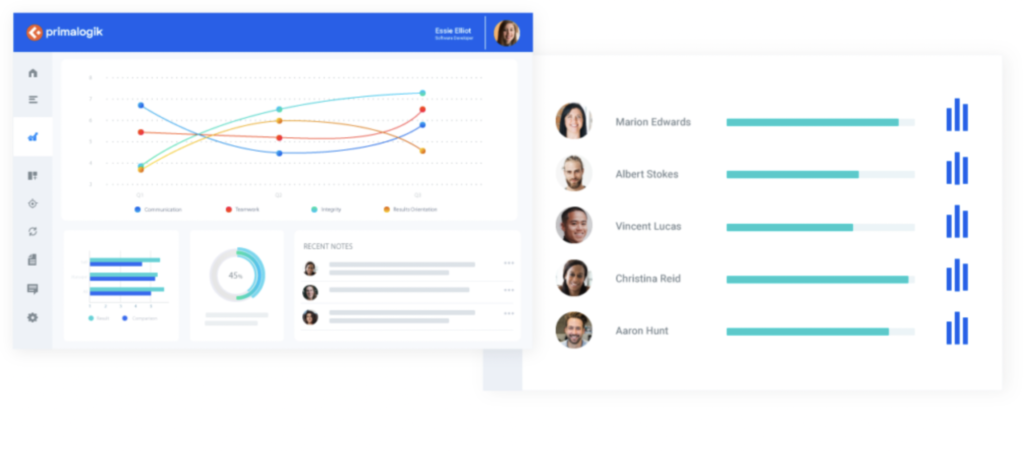Good performance review questions are at the heart of the employee review process.
With the right performance review questions, you can engage in a constructive dialogue with employees and managers, and gather the information you need to develop actionable insights.
Without the right questions, you could find yourself making assumptions, obtaining biased responses, or finding yourself lacking the information you need to make productive decisions.
No matter how carefully you may have thought through the other details of your performance review process — from the frequency of reviews to the length of your questionnaire — you are most likely to get good results if you have chosen thoughtful and well-phrased questions.
So, what types of questions should you ask when delivering performance reviews? Let’s answer that question, right now.
Key Takeaways
- During a performance review, well-phrased questions are crucial for facilitating constructive dialogue and gathering actionable insights.
- Performance review questions can differ in scope and topic for employees, managers, and executives, with each set of questions focusing on relevant competencies for that role.
- Employee-level questions cover topics such as goal achievement, personal improvement needs, collaboration skills, technical proficiency, organizational skills, problem-solving abilities, communication skills, ability to follow instructions, ability to learn from feedback, supporting their professional growth.
- Questions for managers focus on team achievement, the ability to coach and inspire others, communication skills, emotional intelligence, the ability to train employees, project management capacities, performance management skills, grasp of organizational objectives, and the manager’s commitment to personal growth.
- Executive-level questions are broader, covering topics such as communication skills, the ability to lead effectively, strategic thinking abilities, the ability to prioritize and delegate, decision-making proficiency, financial and market knowledge, understanding of business operations, analytical capabilities and the ability to articulate a strong organizational vision.
- When designing performance review questions at any level, avoid leading or simple “yes or no” questions, as they will offer few insights.
- Specialized performance review software can help HR professionals create effective and personalized employee reviews.
Table of Contents
1. The Purpose of Performance Review Questions
2. Categories of Performance Review Questions
3. 88 Examples of Excellent Performance Review Questions
4. Examples of Bad Performance Review Questions
5. How to Generate the Best Possible Performance Review Question
6. How to Answer Performance Review Questions
The Purpose of Performance Review Questions
Performance review questions have a primary goal of transforming an employee review into a productive one-on-one meeting. The idea is to encourage employees to share their unique and valuable perspectives. Effective questions build on the results of surveys and simpler questionnaires. They are meant to dig deeper and even, in some cases, to prompt employees to suggest strategies for maximizing their strengths and addressing areas for development.
Questions can touch on a variety of topics, which means that they will not all have the same purpose. Some questions may aim to find out how the employee is feeling about their work, while others may aim to find out whether they are doing a good job. Is there any correlation between the two answers? By formulating questions carefully, you will obtain answers that you can use to glean precisely this type of insight.
Overall, the purpose of employee review questions is to gather the information you need in order to identify successes and issues. With this information, you can then develop informed strategies to either repeat or avoid specific professional scenarios.
Categories of Performance Review Questions

Effective performance review questions take into account an individual’s progress toward their specific goals. The types of questions asked should be tailored to the employee’s level within the organization. Therefore, relevant topics – and, consequently, relevant questions – will vary to some degree for individual contributors, managers, and executives. Below, we outline topics that are particularly relevant for employees at different levels.
Questions for employees
For employees, performance review questions should cover these key topics:
- Goal achievement
- Collaboration skills
- Technical proficiency
- Organizational skills
- Communication skills
- Ability to follow instructions
- Problem-solving skills
- Ability to learn from feedback
- How the organization and culture can improve
- How the team and manager can improve
First and foremost, employees need to work productively with their team. Second, they need the technical abilities to succeed in their job. They also need time management and problem-solving abilities to truly excel. Questions should be geared toward discovering whether employees are succeeding in these areas, and also why, or why not.
Questions for managers
Managers have different but overlapping concerns. Questions for managers should address issues related to:
- Team achievement
- Ability to coach and inspire others
- Communication skills
- Emotional intelligence
- Ability to train employees
- Project management abilities
- Performance management skills
- Strong grasp of organizational objectives
- Commitment to personal growth
- How the organization and culture could improve
Effective performance reviews for managers should assess their ability to build strong team rapport, lead productive meetings, and successfully complete projects. Choose questions that allow you to explore whether these desired outcomes were in fact achieved. Did interpersonal skills play a role? Questions for supervisors and managers should also address their overall leadership capabilities.
Questions for executives
Performance review questions for executives will be similar to those for managers, but will also touch on broader topics and assess knowledge in addition to leadership skills:
- Communication skills
- Ability to lead effectively
- Strategic thinking abilities
- Innovation
- Ability to prioritize and delegate
- Decision-making proficiency
- Financial and market knowledge
- Understanding of business operations
- Analytical capabilities
- Articulation of a strong organizational vision
- How the organization as a whole can improve
Executives need to grasp the intricate relationships and dependencies between all facets of an organization. They must also be able to lead others effectively across all departments. They must communicate well during business negotiations, conversations with the board, and in other settings. Additionally, they must be able to think in terms of innovation and development while maintaining a strong understanding of the market.
Overall, executives must demonstrate excellent analytical abilities. Effective review questions for executives need to be carefully formulated to determine whether they are succeeding in a variety of areas.
88 Examples of Excellent Performance Review Questions

We’ve grouped performance review questions into the three main employee levels. You’ll see sample questions for the main skills needed at each level, along with general questions.
Employee-level questions
First, we present some general questions on personal improvement needs. Then, we’ll dive into specific topics.
Goal achievement
- What was your greatest accomplishment during the review period? Tell me about the process of achieving it. What steps did you take; what hurdles did you encounter?
- Tell me about your progress on current projects. What steps are you taking toward your goals?
- What growth areas have you focused on? How do you feel about the results you’ve seen?
Temperature check: personal improvement needs
- How could we better leverage your strengths?
- Do you have any strengths that go unused in your daily work?
- What do you contribute that goes unnoticed—or not noticed enough?
- Which areas of your improvement would you like to focus on?
- What would help you to strengthen them?
- What are your greatest barriers to success?
Collaboration skills
- Describe your level of collaboration with your team. Can you share some examples of teamwork you’ve engaged in?
- Could you collaborate more effectively in any ways? Please explain.
Technical proficiency
- What opportunities have allowed you to grow your skills?
- Which skills are you eager to develop?
- What abilities could you train others in?
Organizational skills
- How effectively do you prioritize and manage your time?
- When do you typically begin and end work?
- Do you feel you can leave work at work?
Problem-solving abilities
- Do you feel empowered to think creatively and try new solutions? Why or why not?
- Can you share any examples of how you’ve successfully solved problems?
- Have you proposed novel ideas that benefited the team?
Communication skills
- Have you navigated any tough interpersonal situations? How did you communicate within them?
- Describe how you participate in meetings. What would support you in contributing more effectively?
- Describe challenges in virtual communication that you’ve experienced. What would help you communicate more effectively?
Ability to follow instructions
- Do you have a strong understanding of your role? Please summarize your core responsibilities.
- How well do you typically understand your assignments?
Ability to learn from feedback
- How often have you asked for feedback from your manager? From coworkers?
- How do you respond when others offer unexpected feedback?
- Do you follow up on feedback, asking how you’re progressing?
Supporting the employee’s growth
- How do you learn best?
- Should I change anything about how I share feedback with you?
- What responsibilities do you enjoy the most? The least?
- What role do you aspire toward? What skills or experience do you need in order to get there?
Also ask about how the organization and you as a manager can improve. Inquire about work culture and teamwork.
- How can your team collaborate more effectively? What needs to change for that to happen?
- How can I better support your growth?
- Describe your ideal organizational culture. How can we get closer to that ideal?
- How do you feel about the company vision?
Again, this is not an exhaustive list of performance review questions. It’s simply a starting point. For more ideas, take a look at our Review Template Guide.
Manager-level performance review questions

These questions relate to how managers lead others. You can also ask questions about goals and personal improvement, such as those listed above. It can be helpful to have conversations or do surveys with your employees on these topics as well – just make sure that they are not stressed by the prospect of performance appraisals, no matter what form they take. This will reveal whether managers’ beliefs about their own effectiveness align with employees’ experiences.
Team achievement
- What was your team’s biggest win during the past few months? Describe the efforts that made it possible.
- What do you feel most proud of in regard to your team?
- How have your team’s competencies grown or changed over time?
Ability to coach and inspire others
- What types of coaching do you engage in with your team? Please describe in detail.
- If an employee comes to you with a problem, what steps do you take to help? Describe your typical approach, or share an example.
- Describe the format of your one-on-ones. How often do you hold them, and what topics do you cover? How do you set the agenda?
- Have you witnessed improvement among employees as a result of your coaching? Describe.
- Describe your efforts to improve engagement (or keep it high).
Communication skills
- Describe your efforts to check in with employees about their wellbeing.
- What modes of communication do you find most effective? How do you utilize them?
- What facilitation practices do you engage in to ensure productive meetings?
Emotional intelligence
- If an employee was not pulling their weight, how would you respond?
- Describe something an employee did recently that you felt grateful for. How did you show your appreciation?
Ability to train employees
- What methods of training employees have you engaged in over the review period?
- What techniques do you believe you should use more often?
- How could you improve your teaching abilities?
Project management abilities
- How do you make sure your team meets important deadlines? How did you handle any delays?
- Describe how you worked to troubleshoot issues that arose during a project.
Performance management skills
- How do you evaluate employees’ progress? What evidence do you use?
- How do you assess engagement? Have you noticed changes in engagement levels?
- What steps have you taken to boost engagement?
Strong grasp of organizational objectives
- Describe how your team’s work fits into the organizational mission.
- How do your team’s efforts further the organization’s vision?
- Describe how you’ve conveyed the vision and mission to your team.
Commitment to personal growth
- How have you solicited feedback from others, including employees?
- What steps have you taken to act on this feedback?
- How have you followed up to assess your progress?
As with employees, ask questions about organizational improvement as well:
- How can we better support your growth as a leader?
- What tools and resources do you need to manage more effectively?
- Which type of mentorship or training opportunities would benefit you?
- What culture shifts would promote better teamwork throughout the organization?
Now let’s take a look at performance review questions for executives.
Executive-level questions
These questions pertain to the ability to lead at the organizational level. The above questions on goals and personal improvement apply to executives too.
Communication skills
- How would you describe your communication style in meetings? With managers? With lower-level employees?
- How have you worked to strengthen your communication style?
Ability to lead effectively
- Describe your efforts to rally managers behind shared goals.
- Have you received any feedback on your approach? How have you integrated it?
Strategic thinking abilities
- Describe innovative ideas you have worked to bring to fruition.
- How have you and other leaders worked together to adapt to disruption?
Ability to prioritize and delegate
- How do you decide which responsibilities to delegate? Describe how this played out in a recent initiative.
Decision-making proficiency
- Please outline your decision-making process.
- What challenges have you faced in decision-making? How did you handle them?
Financial and market knowledge
- How do you stay current on market knowledge?
- Would you benefit from any learning opportunities in this area?
Understanding of business operations
- Describe how you stay in tune with what each department is doing and how their work connects.
- How do you promote collaboration across these areas?
Analytical capabilities
- Have you expanded your analytical abilities with the help of emerging tools? Explain.
- Would you or other leaders benefit from additional tools?
Articulation of a strong organizational vision
- How do you work to communicate the vision with others?
- Do you believe managers are relaying the vision effectively?
Feedback about the organization
- How can the organization better support your continued development?
- How can our culture improve?
- Does our vision need to change in any key ways?
- Do you need additional support to perform your role?
What makes these performance review questions the right ones to ask? For one thing, they are open-ended. This may not be the right type of question for all situations, but it is a good format for questions for executives, or questions that address more complex subjects. In addition, they take a neutral stance rather than prompting a particular answer. They address a variety of relevant topics and are clearly oriented toward encouraging dialogue.
Choosing which topics to discuss in a performance review depends on the level of the employee being questioned, the type of information you want to gather, and the primary concerns of your business or organisation.
Let’s take a look at questions you shouldn’t ask to lend some perspective.
Examples of Bad Performance Review Questions

Ineffective questions are only one of many common pain points related to performance reviews. Let’s take a quick look at how to avoid these problematic queries.
Avoid leading questions that beg for a “positive” or “negative” answer:
- “Does your team have the outstanding culture we expect here at Company X?”
- “Is your manager overly critical?”
- “Your manager has struggled with accountability in the past. Has that been a problem lately?”
These biased questions also do not prompt employees to elaborate. Avoid “yes or no” questions.
Steer clear of questions that essentially ask more than one question, too. These tricky questions often make an unfair assumption as well. For example, “Does your manager’s tendency to micromanage make you frustrated?” assumes that the manager does, in fact, micromanage.
Plus, it essentially asks two questions: whether the manager micromanages and whether the employee feels frustrated about it. Focus on one thing at a time!
Other examples of questions that make assumptions:
- “Why do you avoid giving feedback to your employees?” (This would only be appropriate as a follow-up question if a manager says she avoids giving feedback.)
- “Do your team’s collaboration difficulties stem from interpersonal issues?”
- “Have misunderstandings of the vision led to trouble with collaborating on projects?”
These loaded questions are difficult to answer accurately. As a result, they can prompt overly positive or negative answers.
How to Generate the Best Possible Performance Review Questions
Remember, it can take some practice to master the formal review process and tailor it effectively to the needs of any specific organization. Making the time and effort to improve the review process, whether by refining your questions or adjusting the timing of the reviews (deciding between yearly reviews, mid-year reviews and 90-day-reviews, for example) will ultimately bring you better results in the long term.
You can refer to the written section of a performance evaluation for more question ideas, or refer to templates and generic lists for further inspiration. Get familiar with common challenges related to performance reviews, so you can have a good idea of how to prepare.
Today’s HR professionals rely on specialized software to create effective employee reviews as easily and efficiently as possible. Primalogik offers a full performance management platform, which includes specially designed online employee performance review software. This tool helps you conduct employee appraisals for managers and employees, and allows you to personalize various elements and add goals to evaluate employee progress. Input your questions and build on yearly performance review successes to guide your team to the next level.
How to Answer Performance Review Questions

Give employees a sense of which topics you’ll cover in the review. Then, they can gather their thoughts beforehand and prepare what to say during the review. Emailing an agenda that presents key topics will help them know what to expect.
Employees should compile a list of their major accomplishments over the review period. Prompt them to think about personal growth achievements as well as outcomes. They should also reflect on key challenges. Taking these steps will promote an organized and detailed discussion.
Emphasize that they should answer honestly. After all, this should be a supportive discussion that highlights areas for growth. Sharing candid input will let you collaboratively design steps for improvement. And keep accurate documentation of all discussions so you can refer to comments and issues in future meetings.
By choosing great questions for performance reviews, you’ll gain insightful data. Tailoring the questions to the employee’s level will provide the most relevant information. Use it to guide their progress throughout the next review period!
Ready to upgrade your performance reviews? Learn how Primalogik can help by requesting a demo of our performance management software.
